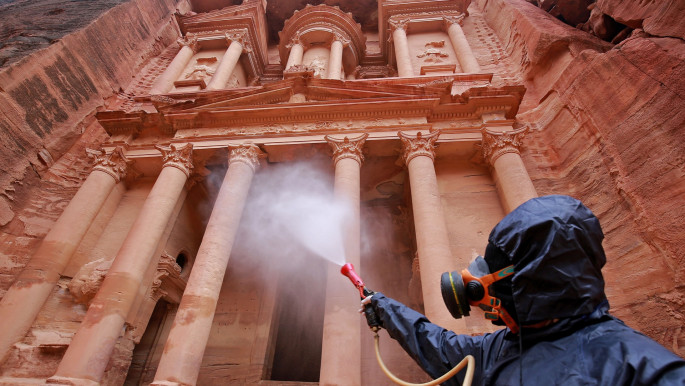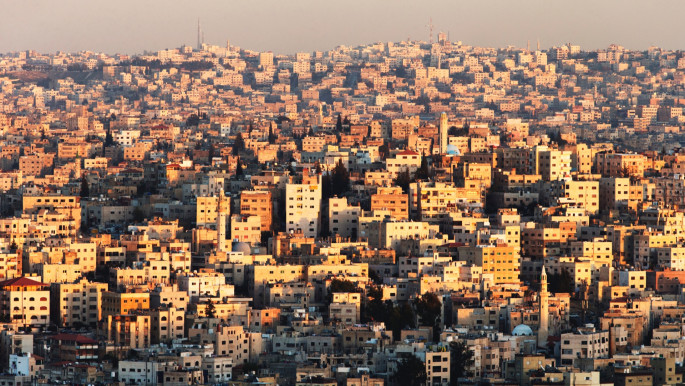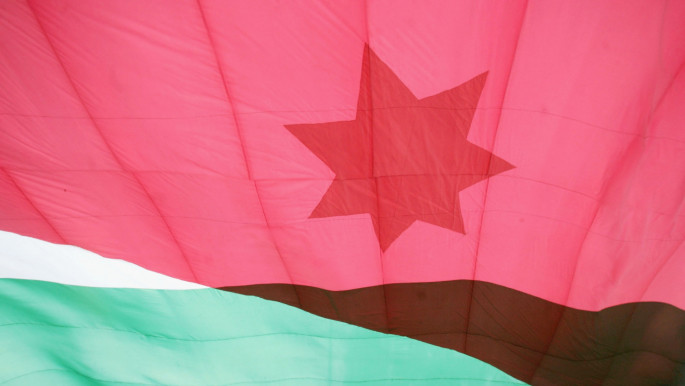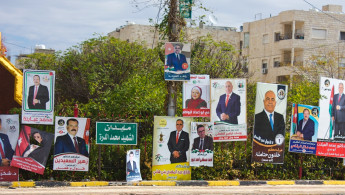Jordan's parliamentary elections: New challenges, old expectations
The colourful banners of political candidates covering Jordan's streets are the only reminder that upcoming parliamentary elections will take place in the country.
Amid a surge in coronavirus cases, Jordanian authorities are firm in their intention of holding the vote on 10 November.
A different election
Social distancing measures have rendered traditional electoral campaigning almost impossible to carry out. Big meetings and rallies have been outlawed, although in some areas, electoral events have seen hundreds of people gather, defying government rules.
"The pandemic is having a serious influence in shaping the electoral campaign. Many candidates are trying to reach out to their constituencies through social media, especially Facebook and WhatsApp, which are widely used in Jordan," Oraib al-Rantawi, director of Al-Quds Center for Political Studies, told The New Arab.
According to the latest poll carried out by the Center for Strategic Studies (CSS) of the University of Jordan, 25 percent of respondents follow their constituency candidates on social media and 44 percent have received some sort of communication from them via tech platforms.
 |
Social distancing measures have rendered traditional campaigning almost impossible to carry out |  |
But not everybody is able to use social media, or even has access to the Internet, particularly in the most deprived areas.
"We need to take into consideration that not all of the districts where our candidates are based are people capable of using a computer, accessing a proper internet connection or using social media," Abla Abu Elbeh, Secretary General of the Jordanian People's Democratic Party (HASHD), told The New Arab.
These new constraints require candidates to reach out to voters face-to-face, organising small gatherings of up to 20 people and respecting government limitations on gatherings, although those are easier to organise in villages and small population centres rather than big cities.
 |
|
| Learning under lockdown: How Jordan's students are adapting to the coronavirus pandemic |
Increased female participation
One of the most important phenomena of these elections is the high number of female candidates. Around 364 out of the 1,693 candidates are female, amounting to over 21.5 percent of the total. Almost every single list has a female candidate and some even more, including several female-only lists.
"The results of research that we carried out found that people trust elected women more because they are more committed and less corrupted. This is an encouraging sign about the political participation and representation of women in our elected bodies," says al-Rantawi.
However, despite the increasing participation of female candidates there are still insurmountable barriers. The political quota, for example, allocates just 15 seats for women, one per governorate, limiting the possibilities of female candidates to win a seat.
Women's rights groups have been calling for a quota of at least 23 seats, one per constituency, even though this will still not reach the 30 percent threshold approved by the government.
"Women in Amman and other big cities need to be better represented. It is not fair that 70 percent of Jordanian women, who live in Amman, Irbid and Zarqa, are represented by just three seats," says al-Rantawi.
 |
One of the most important phenomena of these elections is the high number of female candidates |  |
The elections are also witnessing the increased involvement of political parties. Despite the threats of a boycott, 40 out of 50 registered parties are joining the campaign, most of them in coalitions, including the Muslim Brotherhood's Islamic Action Front (IAF), which is running under the brand 'Islah' (Reform), in coalition with other small parties and independent candidates.
"Unfortunately, the main incentive for the parties to participate in the elections is the financial contribution from the government," explains al-Rantawi.
According to electoral law, a party which runs in at least three constituencies is eligible to receive government financial support. This encourages many parties to run in constituencies where they do not have any chance of winning a seat.
The pervasive influence of the electoral law
Most Jordanians predict that the result of the elections will be very similar to previous ones, due to the design of an electoral system that impedes the formation of parliamentary majorities.
"As long as the electoral law is the same, the result will be the same. Hence, the electoral law is benefiting the capitalists and the tribal system," says Abu Elbeh. This prevents virtually any competition in the parliament, with just 20 or 25 out 130 seats being disputed among candidates.
 |
|
| Read more: Gentrification and grassroots resistance in Amman's historic Jabal al-Weibdeh district |
"The whole electoral process is based on the law of 'one man, one vote' of 1993, and the distribution of the seats is designed very well to guarantee that the opposition will not reach a position in the parliament, not as a majority or even as the biggest minority," says al-Rantawi.
The system does not encourage citizens to cast their ballots. In 2016, voter turnout was 37 percent and this year's prospects are even worse. There is, however, a geographical divide, with very high participation in some tribal areas and very low turnout in urban areas.
According to the latest CSS poll, 50 percent of the respondents said that they will not vote in the elections while only 28 percent confirmed their intention to vote. Among the reasons for abstentions are the lack of confidence in the integrity of the elections (40 percent), the lack of confidence in the parliament (23 percent) and the lack of a qualified candidate (15 percent).
"The political climate has changed. Many people will not go to the voting centres, either because of coronavirus, or because they have lost hope in the political situation in Jordan," says Abu Elbeh.
The pandemic has impacted the role and perception of the parliament in Jordanian political life ever since the approval of emergency laws which constrained its activities.
"For many Jordanians, if elections do not come up with a parliament and a parliamentary majority that can create a government, there is no reason to vote," says al-Rantawi.
 |
The political climate has changed. Many people will not go to the voting centres, either because of coronavirus, or because they have lost hope in the political situation in Jordan |  |
Will the elections take place?
Many citizens have been calling on social media to postpone the elections due to increasing coronavirus cases, but experts believe that this will not happen.
The Independent Electoral Commission (IEC) has the mandate and the power to postpone the elections until 26 January 2021. Based on the Jordanian constitution, elections should be conducted in the four following months after the dissolution of the parliament, which took place on 27 September. After that timeframe, the postponement is only possible through a royal decree.
"Based on the information that we have so far, the elections will take place on time. This is the trend, unless we are faced with an uncontainable number of cases," says al-Rantawi.
 |
|
| The screams of Ahlam: Harrowing honour killing in Jordan sparks movement for justice |
Although everybody agrees on this forecast, not everybody is happy with it.
"If it comes to my wishes, we want them to be postponed. Actually, they could have happened in April or May, when the number of cases was very low, but they have waited until the figures are really high, which makes people afraid and stay at home," says Abu Elbeh.
Al-Quds Center for Political Studies asked to postpone the elections and extend the previous parliament for one year with the twofold aim of avoiding negative consequences and debating the electoral system.
"Our idea was to give ourselves time for a national dialogue about what electoral system we need and what the role of the parliament in our political system is," explains al-Rantawi, lamenting that their proposal was rejected.
He believes that there is no political interest in having a strong parliament that will lead to a parliamentary government, a distant prospect right now for Jordan.
"For me, it is an empty process, and I do not think that it will make any change to the democratisation process in our country," al-Rantawi said.
Victoria Silva is a freelance journalist based in Jordan, covering Middle East affairs for Spanish media.
Follow her on Twitter: @VickyShishaz



